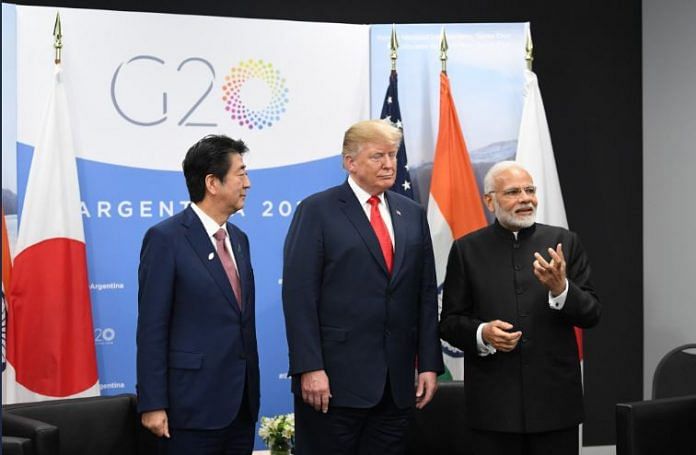This week’s G-20 summit in Japan will showcase both what’s best and most frustrating about this once-promising construct for coordinating global policy. A simple institutional fix could address many of the problems. All that’s required is some bold leadership on the multilateral stage.
Founded in 1999 to include 19 countries and the European Union, the G-20 was the result of frustration with the effectiveness of existing multilateral institutions and the realization that smaller entities such as the G-7 had become insufficiently representative. It included systemically important countries and other influencers which together accounted for two-thirds of the world’s population, some 90% of its annual production and over three-quarters of its trade.
Purposely designed to be agile and effective, its presidency was to rotate annually among the membership. It was, for the same reasons, denied a permanent secretariat. Instead, the task of following up on the group’s decisions and crafting a strategic arc was left to a rotating grouping of three presidencies (current, past and future).
The G-20’s potential to reach timely, collective solutions to tough global problems was illustrated most vividly in 2009. Under the insightful presidency of U.K. Prime Minister Gordon Brown, it spearheaded dramatic global actions that helped the world avoid what would have been a devastating multi-year depression.
Yet many observers and participants would agree that the G-20 has fallen short of its promise overall. Most notably, the group has repeatedly struggled to act as an effective catalyst for solving long-term challenges facing the global economy. Its meetings have proliferated to include a wider group of officials and topics that extend well beyond what was initially viewed as its core mission. Meanwhile, the intimacy of its gathering, once viewed as a powerful differentiator, has been undermined by a growing list of invitees, including permanent guests, and a proliferation of parallel groupings and gatherings.
Also read: India to host G-20 summit in 2022
This is not to say that the G-20 has been a failure. Year after year, it has provided a useful forum for officials to meet bilaterally outside the intense media glare and the sky-high expectations that tend to accompany state visits. It also provides a good opportunity to deal with urgent issues that, more often than not, pop up in today’s more fluid and unpredictable global economy.
This year’s gathering in Japan is a good example. It is providing the forum for a meeting between the U.S. and Chinese leaders to discuss bilateral trade issues that have cast a cloud over global growth. The growing tensions in the Middle East, including the U.S. desire for more coordinated pressure on Iran, is also likely to be a topic of discussion. And then there are the thematic issues identified by the Japanese presidency.
But, what is likely to again be missing is a sense of collective meaningful progress on longstanding issues that threaten global growth and financial stability. Indeed, we need only go back and look at the lack of sufficient follow-through on the themes that other member countries embraced during their presidency, including those where attempts were made to specify metrics to be monitored.
Part of this failure is, I believe, due to the G-20 lacking a permanent secretariat. According to several officials involved in the formation of the G-20, the hope was that the grouping could thereby maintain an agile and responsive structure that would avoid capture by a large bureaucracy, endless mission creep and ever-deepening principal-agent problems. It also reflected late 1990s frustration with the International Monetary Fund, which was viewed by some as having mishandled the Asian crisis, and the fear of fragmentation highlighted by Asia’s (ultimately unsuccessful) efforts to set up a regional Asian Monetary Fund.
Yet some of what the founders wished to avoid has transpired anyway. Successive national presidencies have found it easier to add topics than to remove those they’ve inherited, and they have been excessively open to inviting guests and creating new parallel structures. In addition, the lasting impact of the G-20’s work has been hindered by insufficient follow-through, as well as operational priorities that change too rapidly from year to year as the presidency rotates.
Also read: G-20 finance ministers have lost relevance – Trump is now the secretary of everything
The addition of a small secretariat (3-4 people) would help address these issues without creating a big bureaucracy that would gain a momentum of its own. With preferential access to the analytical resources of existing large multilaterals, something that G-20 members can easily ensure given their commanding role in global economic governance, it could provide the multi-year strategic air cover that the G-20 urgently needs, while allowing for much better operational monitoring and follow-up. Being less bound by diplomatic niceties, it could also better resist the proliferation of attendees and topics.
For all this to work, however, a currently more inward-oriented U.S. would need to take a leadership role, especially as neither China nor Europe are in a position to do so on their own. The need will again be demonstrated in Japan this week, when a focus on tactical issues is unlikely to be accompanied by sufficient progress on the strategic challenges facing the global economy and the financial system.
Getting future G-20 summits to focus productively on both, tactical and strategic, is much less of an engineering problem than a political one. The faster that’s addressed, the greater the chance of the G-20 being more effective in supporting robust, inclusive growth and genuine global financial stability.



